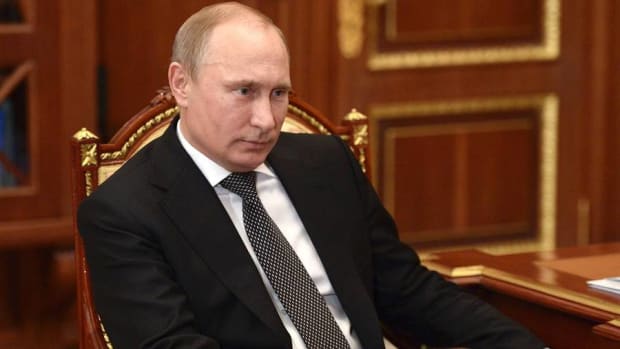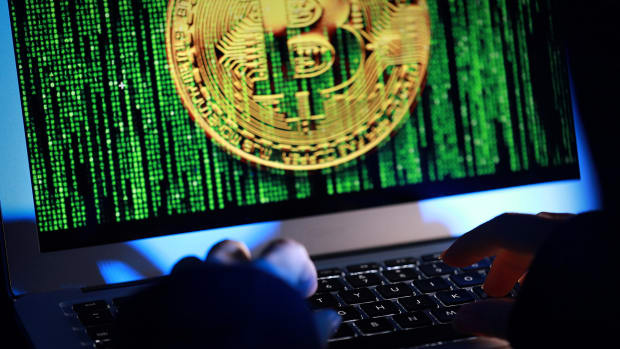The Russian invasion of Ukraine and rapidly intensifying sanctions against people closely connected to Russian President Vladimir Putin has brought a new urgency to regulating cryptocurrencies, with a decision on new rules now being projected for this week.
For many investors who have bought into bitcoin, the cryptocurrency doesn't just represent a once-in-a-lifetime investment opportunity, it also represents financial autonomy. That has been particularly true for Russian oligarchs, who have plowed billions into a variety of coins and exchanges.
But a digital currency that can be transferred peer to peer without the oversight of banks or government regulatory agencies is attractive to both law-abiding investors and bad actors alike.
For weeks news outlets have reported that President Joe Biden and the White House will be unveiling their framework for regulation of cryptocurrencies soon.
And given recent events in Eastern Europe, how and when cryptocurrencies might be regulated — or sanctioned — is at the top of everyone's minds.

What Could Be On the Cards For New Regulations?
Though the Russian invasion of Ukraine has been rattling global markets, what to actually do about sanctioning or overseeing crypto wealth has largely puzzled global regulators.
American lawmakers have some practice at drafting coin sanctions: They have been widely deployed against unfriendly states North Korea and Iran, for example, and that framework may provide a sneak peek into what the Biden administration's rules may be.
Until then, some of Russia's most-sanctioned citizens —including 351 members of its parliament, the Duma — and other well-connected oligarchs have been rumored to be putting much of their now-sanctioned wealth into currently untraceable coins.
You can read more about that process, and how it may evolve, here.
In February, steps the Canadian government took to punish some crypto investors made the whole sector nervous.
Canadian Prime Minister Justin Trudeau enacted the country's Emergencies Act in response to a trucker protest that has clogged important U.S. trade arteries and has caused nuisance and disruption in the capital city of Ottawa.
The Emergencies Act allows Trudeau's government to order financial institutions, without court orders, to freeze personal and corporate bank accounts connected to the protest.
"This is about keeping Canadians safe, protecting peoples' jobs and restoring faith in our institutions," Trudeau said during a press conference announcing the implementation of the new rules.
While this example may be in the extreme, it does offer a glimpse into just how much power governments can have over financial transactions in their country.
The U.S Will Be Tightening Crypto Regulation Soon
Those hoping to escape the grips of big brother through cryptocurrencies may not find the financial freedom they were expecting by the time the new rules are laid out.
Biden is expected to issue an executive order next week directing agencies across the government to study cryptocurrencies and a central bank digital currency, and to come up with a government-wide strategy to regulate all digital assets, Yahoo reported.
On Feb. 17, the Justice Department announced the appointment of Eun Young Choi as the first Director of the National Cryptocurrency Enforcement Team (NCET).
"The NCET will serve as the focal point for the department’s efforts to tackle the growth of crime involving these technologies," said Kenneth Polite Jr., the assistant attorney general of the DOJ's crime division.
Meanwhile, the FBI is forming its own cryptocurrency alphabet team. The Virtual Asset Exploitation Team (VAXU) will "provide equipment blockchain analysis, virtual asset seizure and training to the rest of the FBI," according to Lisa Monaco, deputy U.S. attorney general.
That unit will be folded into the NCET.
In February, Treasury Undersecretary Nelli Liang told the Senate that the Financial Stability Oversight Council (FSOC), which was created after the 2008 market crash to monitor risks to the financial sector, is studying the prospect of risks so-called stablecoins pose to financial systems and is taking steps to regulate them.

Shutterstock
Tighter Regulation Could Spur Crypto Adoption
Regulation advocates would point out that if you are not using cryptocurrencies to do anything illegal then they have nothing to worry about.
Counterintuitively, tighter regulations could spur even greater investment in digital assets as the government gives the space a sense of legitimacy through its involvement.
India, for example, saw an explosion in crypto interest since the country issued a 30% tax on profits from crypto trading.
WazirX, India's largest crypto wallet, has seen daily sign-ups on its platform jump almost 30% since Feb. 1 when the government announced the tax, Bloomberg reported.
So there is evidence that government intervention won't be the end of the crypto party.
For or against, ready or not, crypto regulation is coming as soon as next week and investors should be ready to play by a set of new rules when the rules do come down.







